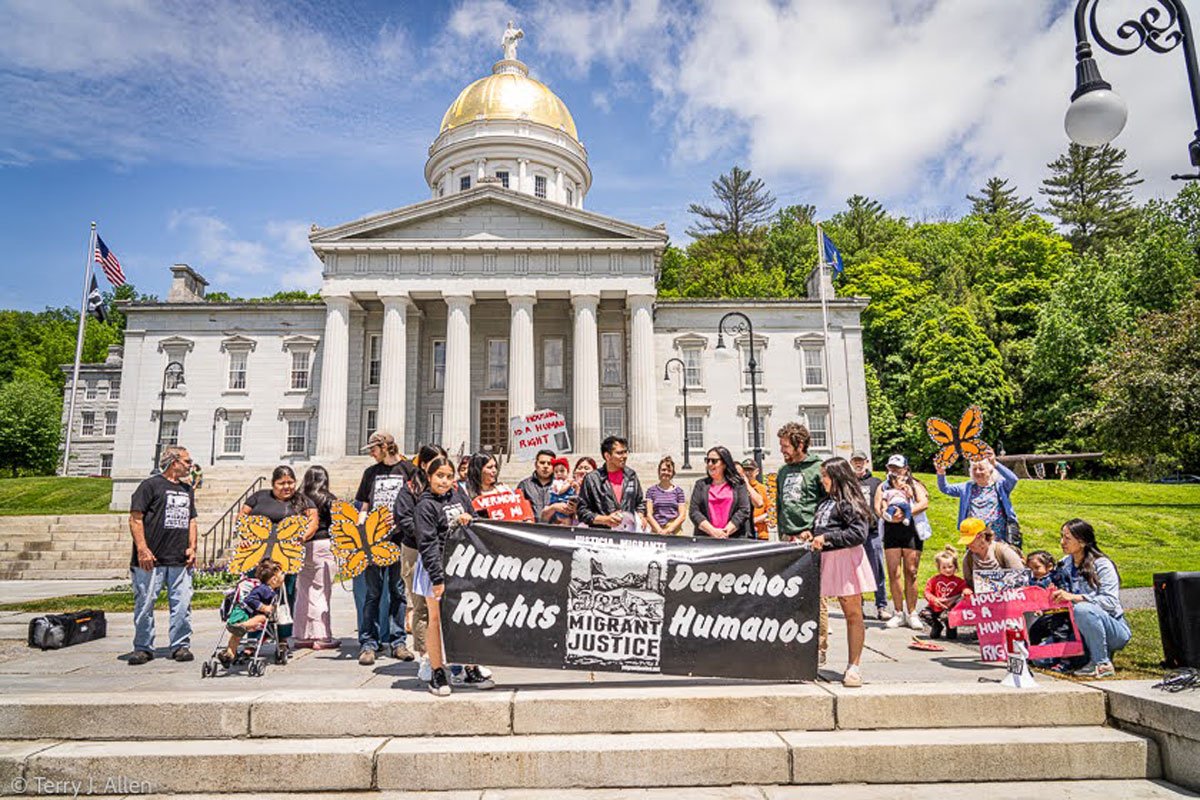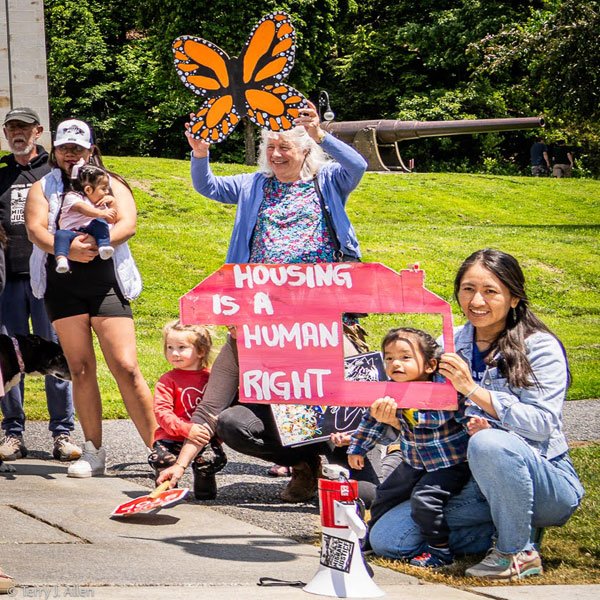A new state law establishes protections for immigrant families against housing discrimination, helping end decades of difficulty for farmworkers searching for an affordable place to live.

A new state law establishes protections for immigrant families against housing discrimination, helping end decades of difficulty for farmworkers searching for an affordable place to live.
July 16, 2025

Immigrant community leaders and supporters gather in front of the Vermont State House on Friday, June 13, to celebrate the passage of a new state law protecting immigrant housing rights. The celebration was organized by Migrant Justice, a Vermont-based human rights organization founded and led by immigrant farmworkers. (Photo credit: Terry Allen)
Under a freshly enacted Vermont bill on housing that bars discrimination on the basis of citizenship or immigration status, immigrant farmworkers no longer need to submit a social security number on rental applications.
Expand your understanding of food systems as a Civil Eats member. Enjoy unlimited access to our groundbreaking reporting, engage with experts, and connect with a community of changemakers.
Already a member?
Login
Moreover, landlords cannot refuse an application if that number is not provided; they must accept any form of unexpired government-issued identification. They also cannot charge application fees for a residential dwelling.
Republican Governor Phil Scott signed Senate Bill 127, the Vermont Rental Housing Improvement Program, on June 12, and the next day, Migrant Justice—the Vermont-based organization that conceived the measure—took to the State House steps to celebrate.
“This is a really big deal for us, and maybe it wouldn’t seem like such a big deal for everybody if they haven’t been in that situation,” said a member of Migrant Justice who requested anonymity to protect her from reprisals.
The member said that in Vermont, opportunities for undocumented immigrant families to find housing are slim. While individuals who have been naturalized or received green cards are eligible for federally subsidized housing, undocumented individuals are not, which reduces housing opportunities for them. H-2A guest workers, typically single men employed under seasonal contracts, aren’t generally seeking housing, as their lodging is provided by their employers—often on the farm itself.
As a result, the member continued, many immigrants in Vermont struggle to find secure, safe living situations.

A moment from the immigrant housing law celebration at the Vermont State House in Montpelier. (Photo credit: Terry Allen)
“We’ve been seeing a lot of abuses,” Representative Leonora Dodge (D-Essex), who sponsored the bill, said. “A lot of young families are experiencing very dangerous situations, overcrowding, and instability. It’s a very tough housing market in Vermont, and people who were able and willing to pay rent, and could give good references, just weren’t even getting a foot in the door and were being rejected.”
A 2021 report published by the Vermont Housing Conservation Board found that 85 percent of farmworker housing in the state needed improvement, and that a lack of additional dwellings on farms had led to overcrowding.
Year-round migrant dairy workers make up the largest group of immigrant farmworkers in Vermont, and the majority—whether single workers or families—live on the farms where they work. Having an employer who doubles as a landlord puts immigrant workers “in a particularly precarious and vulnerable position, as they may be less likely to report discrimination, poor working, or poor housing conditions to government officials due to fear of deportation and are unable to access federal funds to support their housing needs,” according to the state’s 2024 Fair Housing Analysis.
“It’s a very tough housing market in Vermont, and people who were able and willing to pay rent, and could give good references, just weren’t even getting a foot in the door and were being rejected.”
“What that means for people in the farmworking community is that we’re obligated to stay on jobs where our rights aren’t being respected and we’re being abused, just because the farm is the only place where we’re able to get housing,” said the Migrant Justice member.
Migrant Justice, which has long advocated for the immigrant community, first approached the state legislature with their housing proposal in 2023; however, it didn’t gain traction. According to Vermont Public, landlords and bankers have been concerned that they couldn’t run credit and background checks without a Social Security number.
“To make a landlord have to take somebody—even if they’re not here legally—I think is a challenge and a big ask,” Angela Zaikowski, director of the Vermont Landlord Association, told lawmakers at a hearing in April.
In the same article, Christopher D’Elia, president of the Vermont Bankers Association, was quoted as saying, “the credit risk analysis becomes much more difficult and heightened,” when lending to undocumented immigrants. If “two weeks from now [they] may be deported, what’s the credit risk of being able to get repaid on that loan?” he added. “That is the reality we find ourselves in.”
Dodge spoke with landlord advocates who work nationally and learned that it’s possible to run credit and background checks with just a name, address, and birth date.
With this information, Dodge reintroduced the measure in the Vermont House of Representatives earlier this year as House Bill 169, using testimony from landlords, Migrant Justice members, attorneys, and bankers to negotiate the language.
The Vermont Housing Conservation Board found that 85 percent of farmworker housing in the state needed improvement, and that a lack of additional dwellings on farms had led to overcrowding.
Determined to see it pass, Migrant Justice built a coalition of more than a dozen state government agencies and community organizations in support of the bill, including Housing and Homelessness Alliance of Vermont, Vermont Human Rights Commission, and ACLU of Vermont.
“Migrant Justice was really the spirit. They spearheaded the effort,” Dodge said. “As the sponsor of the H.169 bill, my job was to lay the groundwork on the political and legislative side.”
The resulting measure was folded into S.127—an omnibus housing bill—which received bipartisan approval.
Now, with S.127 enacted, advocates say they hope the paperwork barriers that prevent immigrant farmworkers from accessing fair housing will be alleviated, giving them more autonomy to find better job opportunities and living conditions.
“We’re really happy to have this new law in place, because it means that workers aren’t tied any more to jobs where we’re being abused,” the Migrant Justice member said. “We’ll have the ability to find our own housing.”
Vermont is one of a handful of states to enact housing access protections for immigrants into law. California was the first, passing its amendment in 2015. Other states, including Washington, New York, Oregon, Colorado, Washington, D.C., and Illinois, have also implemented similar measures.
“I think that it’s so important that we pass legislation with the recognition that immigrant workers are people, and we have to address their whole experience and not just take advantage of them and exploit their labor,” Dodge said.

July 30, 2025
From Oklahoma to D.C., a food activist works to ensure that communities can protect their food systems and their future.
Leave a Comment